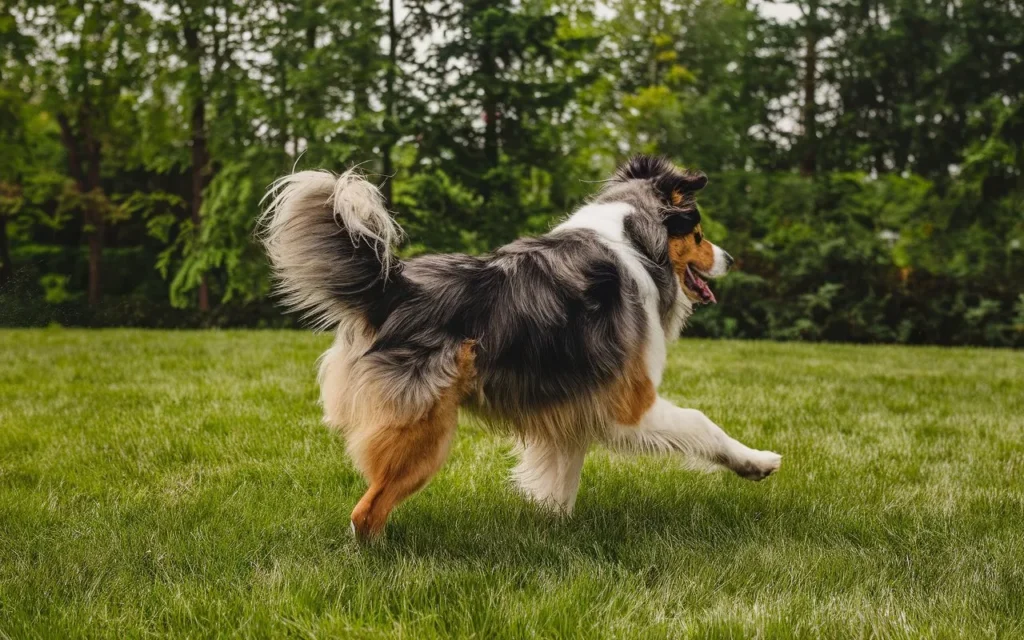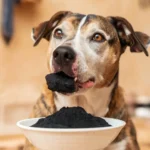If you’ve ever wondered “why do dogs kick their back legs”, you’re not alone. It’s a quirky and fascinating behavior that many dog owners notice but rarely understand. There could be many reasons behind this phenomenon—sometimes it’s instinct, sometimes it’s a reflex, and sometimes it’s just a bit of fun. Let’s dive into the world of dog behavior to better understand why they kick their back legs.
Why Do Dogs Kick Their Back Legs Randomly?
When dogs randomly kick their back leg, it can seem quite puzzling. Most often, this behavior is an involuntary response known as the scratch reflex. When certain areas of a dog’s body are touched, it triggers a response in their nervous system, causing the leg to kick out in response. This is particularly common when you scratch their belly—which is also why dogs often love a good belly rub. The reflex can vary in intensity, and dogs may exhibit different reactions based on their level of comfort.
Additionally, sometimes dogs randomly kick their legs while lying down because they are stretching or feeling discomfort. If you’re wondering, why does my dog keep kicking his back leg when lying down, it could be due to muscle tightness, a playful reflex, or even a mild cramp. Dogs have unique ways of relaxing their muscles, and kicking their legs helps to alleviate discomfort.
Another reason behind random leg kicks could be an attempt to get your attention. Dogs often learn that certain actions—like kicking their legs—can prompt a reaction from their owners. If you laugh or pet them when they do it, they may associate the action with positive reinforcement, leading to repeated behavior.
What Does It Mean When Dogs Kick Their Back Legs?
There are multiple explanations for why a dog kicks their leg. The behavior might indicate pleasure or indicate a response to specific physical stimuli. When dogs are petted, especially on their back or belly, the scratch reflex is activated. This reflex isn’t a sign of irritation—in fact, it’s often a sign that you’re hitting a good spot, and they’re feeling relaxed and content. The involuntary motion is an indicator that the spot you’re scratching is triggering nerves connected to their back legs. Dogs are prone to such leg kicks because their skin is highly sensitive, and stimulating the nerves in the skin can make the leg go off involuntarily.
- Dogs may kick their legs when they are playing or feeling excited.
- Running around and kicking their back legs is a way of letting out energy and showing excitement.
- Why do dogs kick their back legs when playing? It’s all about energy and fun—they kick as part of their natural movement during play to express happiness.
Another thing to consider is that dogs may kick their legs in response to stimuli that they find surprising or unfamiliar. This is especially true if the petting or scratching sensation is sudden or unexpected. You may also notice that some dogs are more prone to kicking than others, depending on their temperament, breed, or level of sensitivity.
Understanding the Scratch Reflex in More Detail
The scratch reflex is sort of a pretty complex biological reaction. In instances where a dog experiences scratching or, worse, tickling, the skin sensory neurons take over and send these signals across to the spinal cord, where the sensation is processed and then responded to with the kicking motion. This happens automatically-meaning, without the dog’s cognitively thinking of kicking.
In this sense, the scratch reflex is similar to other involuntary reflexes, such as blinking when something comes close to your eyes. It is a defensive mechanism to help dogs deal with potential irritants like insects or parasites on their skin. This fascinating reaction reveals just how finely tuned a dog’s nervous system is and highlights the evolutionary need for survival mechanisms, even in domesticated pets.
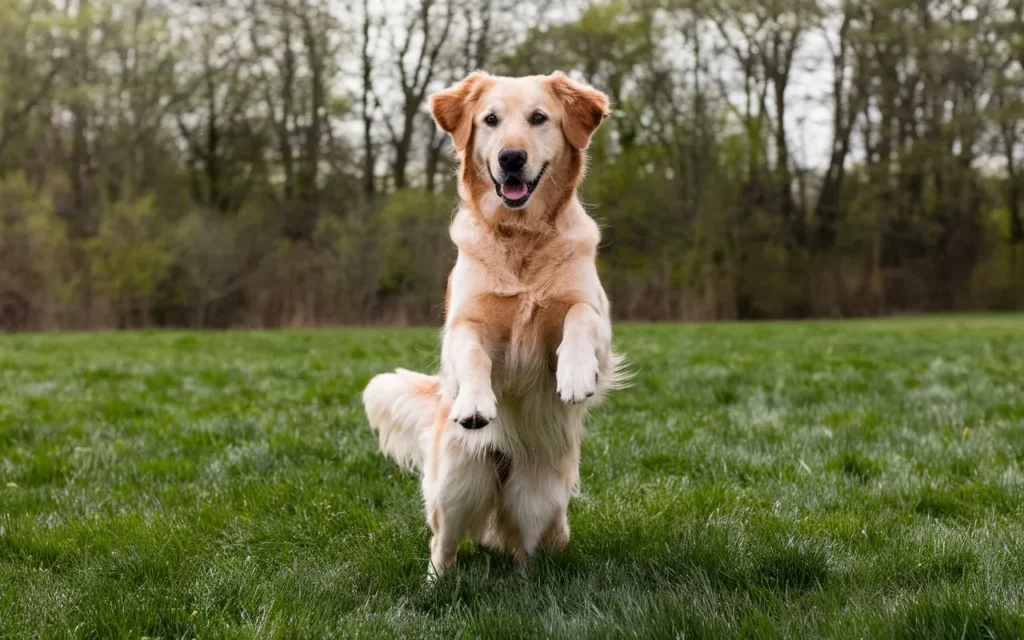
Why Do Dogs Kick Their Back Legs After Pooping?
One of the more mysterious dog behaviors is when they kick their back legs after pooping. If you’ve asked yourself, why do dogs kick their back legs after they poop?, there are a few potential explanations. This behavior is thought to be an instinctual way for dogs to mark their territory. The act of kicking helps spread their scent in the area, emphasizing their presence and communicating with other animals. Dogs have glands in their paws that release scent, and by kicking the ground, they are effectively sending a message: “This is my spot!”
- Another reason for this behavior is to help with covering up the scent.
- Though domesticated, dogs retain instincts from their wild ancestors.
- Kicking dirt and grass helps mask the scent, reducing chances of detection by predators.
- This instinctive action is a carryover from their survival tactics in the wild.
Territorial Behavior and Communication
Kicking after pooping could also serve as a visual marker besides leaving the scent. Dogs are very visually oriented, and that kicking motion helps create an impression on the ground to indicate to other dogs that this is ‘taken.’ It is akin to the way wolves and other wild canines mark their territory for dominance and in communication with pack members or intruders.
This behavior is not limited to dogs in rural areas; urban dogs do this as well. Even if there is no immediate threat or competition, the action is ingrained in their DNA. Essentially, it’s a behavior that has survived domestication because it still serves a psychological and instinctual purpose for your pet.
Do Dogs Enjoy Kicking Their Back Legs Due to the Scratch Reflex?
Do dogs enjoy the scratch reflex? It’s a question many dog owners ponder as they watch their pets kick their legs during a belly rub. For most dogs, the answer is yes—dogs enjoy being scratched in areas that activate their scratch reflex. The kicking of the leg might look strange to some, but dogs often find it a pleasant and relaxing experience. It’s similar to an itch being scratched—relieving and enjoyable. When scratching your dog’s belly, it’s important to observe their body language to ensure they’re comfortable, as some dogs might not like it.
- Dogs may show enjoyment by relaxing their body and even closing their eyes.
- The scratch reflex can be a fun bonding experience, but always ensure your dog is comfortable.
- Some dogs may yawn, lick their lips, or even groan when they are enjoying a scratch.
Dogs’ scratch reflex can also be a means of communication. When they kick their legs and appear relaxed, it’s a sign they are feeling comfortable around you. This is an indicator of trust and relaxation—a positive sign that your furry friend feels safe and happy.
However, every dog is unique, and not all dogs will react the same way. Some may be more sensitive and not appreciate the scratching in certain areas, while others may actively seek out belly rubs to experience that pleasurable kick. Always take cues from your dog’s behavior to understand their preferences.
Signs Your Dog Loves the Scratch
- Relaxed posture: If your dog appears relaxed, stretches out, or rolls over more, it’s a sign they are enjoying the scratch.
- Kicking intensity: Some dogs will kick energetically, which means they are feeling stimulated and playful. Others may give gentle kicks, indicating a relaxed pleasure.
- Vocal cues: Dogs may make low grunts, sighs, or groans when experiencing pleasure from a good scratch.
- Initiating the scratch: Dogs who enjoy it may nudge you or roll over to encourage you to scratch them more.
Why Do Dogs Kick Their Back Legs While Sleeping?
Dogs sometimes kick their back legs while sleeping, and this can be both amusing and puzzling for pet owners. If you’re wondering, why do dogs kick their back legs while sleeping, it often has to do with dreaming. Dogs go through sleep cycles similar to humans, and during the REM (Rapid Eye Movement) phase, they may experience dreams. As part of these dreams, they might be reliving a chase, playing, or even just running, which triggers involuntary muscle twitches—often resulting in the kicking motion. This is completely normal behavior and nothing to worry about.
In some cases, a dog’s kicking during sleep might be due to muscle twitching as they relax deeply. These twitches are similar to what happens when we experience “sleep starts” or sudden jerks while dozing off. As dogs experience relaxation, their muscles loosen, leading to involuntary movements.
Dreaming and REM Sleep in Dogs
REM sleep is a critical phase for dogs, just like it is for humans. During this phase, their brains are very active, and their bodies can show signs of the dreams they are having. It’s believed that dogs dream about activities they engage in during their waking hours, such as chasing, playing, and exploring.
You may notice that the intensity of kicking varies depending on the dream. A particularly exciting or vivid dream may result in more pronounced movements, while a peaceful dream may cause only light twitching. It’s always a joy to watch a dog’s paws moving as if they are running while they are deeply asleep.
How to Ensure Your Dog’s Comfort While Sleeping
- Provide a Comfortable Bed: Ensure your dog has a soft, supportive bed that cushions their joints. This can help minimize muscle discomfort that might cause excessive kicking.
- Observe Their Sleep Patterns: It’s normal for dogs to kick occasionally during sleep, but if you notice excessive twitching, it could indicate discomfort or a neurological issue that may need veterinary attention.
- Maintain a Consistent Routine: Dogs thrive on routine. Maintaining consistent feeding, walking, and play schedules can promote healthier sleep patterns.
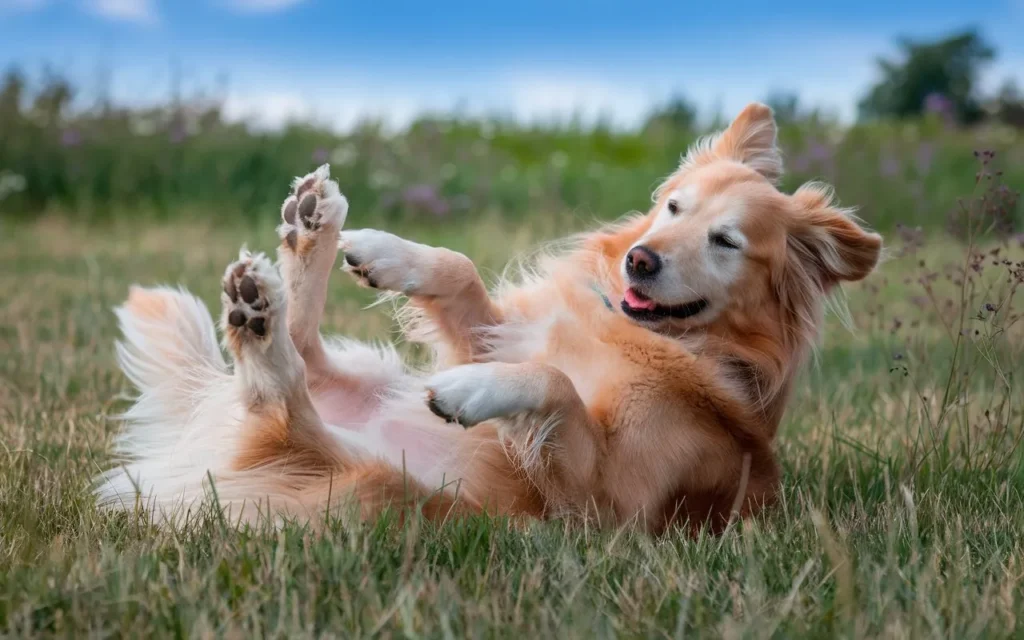
Why Do Dogs Roll On Their Backs and Kick Their Back Legs?
Dogs rolling on their backs and kicking their legs is often a sign of playfulness and trust. When a dog rolls over and exposes its belly, it’s a vulnerable position that shows they feel secure and happy. If you’ve ever asked yourself, why do dogs roll on their backs and kick their legs, the answer likely involves play, comfort, or a request for attention. Some dogs do it as an invitation for play or a belly rub, and the kicking adds an extra playful element to their behavior. It’s also a means of self-soothing when they’re feeling relaxed.
- Rolling and kicking can help scratch an itch on their back.
- Dogs lack flexibility to reach certain parts of their body.
- Rolling and kicking is their way of scratching an itch without external assistance.
Play Behavior and Social Bonding
Rolling on their backs and kicking can also be a way for dogs to express submissiveness or an invitation to play. In dog-to-dog interactions, rolling on the back is a sign that they are not a threat and are willing to engage in playful activity. When your dog rolls over in front of you, it’s often a sign of trust and a way of asking for interaction.
The kicking motion adds to the playfulness, and many dogs enjoy this as part of a game. They might swat at you with their paws or gently kick to entice you into playing along. Engaging with your dog during these moments can strengthen your bond and provide them with the mental stimulation they crave.
Is It Always Playful?
Sometimes, rolling and kicking can also be a sign that your dog is trying to relieve a skin irritation. Fleas, dry skin, or allergies could make your dog roll around in an attempt to relieve the itchiness. Make sure to check your dog’s skin regularly and address any potential issues like fleas or dryness to keep them comfortable.
Why Do Dogs Kick Their Back Legs When Lying Down Awake?
If your dog keeps kicking his back leg when lying down while awake, it may be due to a mild muscle spasm or a response to discomfort. You might be wondering, why does my dog keep kicking his back leg when lying down? One reason could be muscle relaxation—just as we stretch and adjust ourselves for comfort, dogs kick their back legs when trying to relieve tension in their muscles.
This can also be indicative of pain-say, arthritis or muscle spasms. If you are finding this behavior to be repetitive or painful-looking, take your pet into the vet. By keeping an eye on his comfort level and watching for other signs such as whining or limping, you will be able to gauge whether or not a trip to the doctor is in order.
Possible Medical Reasons for Leg Kicking
- Arthritis or Joint Pain: Older dogs may kick their legs more often when lying down due to joint pain or arthritis. Kicking can help them adjust their position to alleviate discomfort.
- Muscle Cramps: Just like humans, dogs can get muscle cramps that cause involuntary movements. This can lead to leg kicking as a way to relieve the tightness.
- Neurological Issues: In rare cases, frequent leg kicking can be related to neurological problems. If your dog seems disoriented or experiences muscle tremors in addition to kicking, consult a veterinarian for a thorough examination.
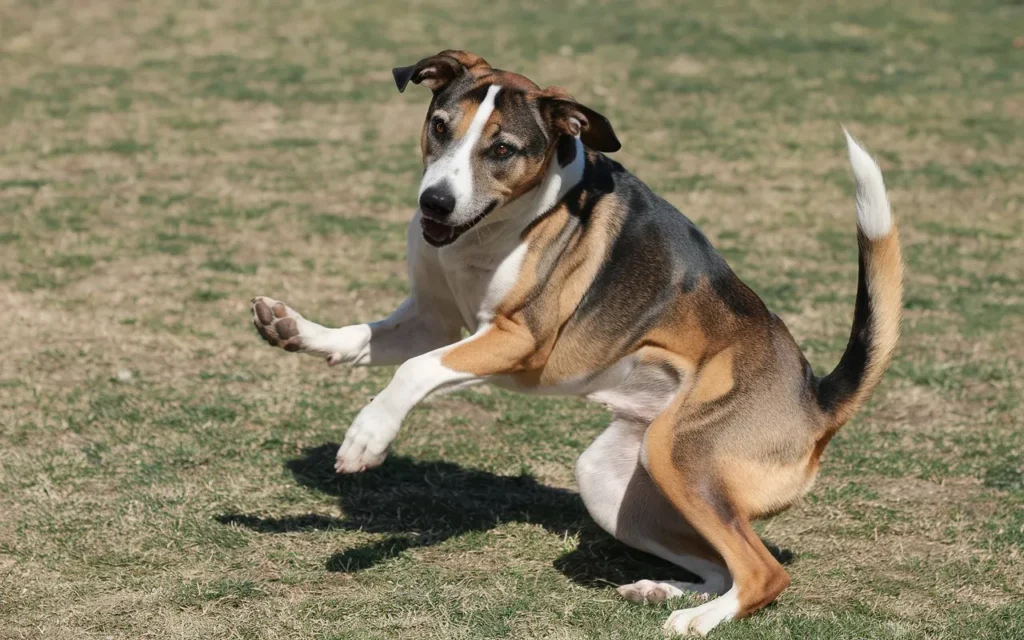
Why Do Dogs Kick Their Back Legs After Peeing?
Another common behavior is when dogs kick their back legs after urinating. Why do dogs kick their back legs after they pee? This action is similar to kicking after pooping. It’s a way to spread their scent further and assert territory. The glands in a dog’s paws release pheromones, and by kicking, they’re able to mark the area more effectively than by just urinating.
Other interesting instincts involve kicking after urination, which is a dominance behavior. Centuries have passed, yet wild canines have managed to continue this behavior as a form of leaving a message to other animals about territorial presence and dominance. It is a behavior so deeply entrenched in their natural instincts and follows them into domesticated settings.
- Kicking after urination helps spread pheromones released from glands in the paws.
- This behavior communicates presence and territorial boundaries to other animals.
- It is instinctual and persists even in well-trained, domesticated dogs.
Marking Territory Beyond Scent
When dogs kick after urinating, it’s not just about spreading scent. It also leaves visible marks on the ground. In the wild, these visual cues can warn other animals to stay away from a dog’s territory. It’s a multi-layered form of communication that uses scent, movement, and visuals to effectively convey a message.
These are displacements for pet dogs and out-of-place behaviors on manicured lawns or sidewalks. The key to this behavior is remembering that it is deeply engrained in their genetics; dogs will do such things to satisfy their instincts in the city.
Why Do Dogs Kick Their Back Legs When You Scratch Them?
Dogs often kick their back legs when you scratch them in specific areas—typically on the belly or sides. The reason behind this is the activation of their scratch reflex. If you’re curious about why do dogs kick their back legs when you scratch them, the answer lies in nerve endings. When you scratch, you’re stimulating certain nerves that trigger the involuntary kicking action. This reflexive motion is similar to a knee-jerk reaction in humans when the doctor taps below the knee.
While many dogs seem to enjoy the feeling of being scratched and the subsequent leg kicking, it’s crucial to watch for any signs of discomfort. Some dogs might prefer less intense scratching and could find constant activation of the reflex irritating. Always pay attention to your pet’s reactions to make sure the scratch is enjoyable and comfortable.
How to Scratch Your Dog the Right Way
- Pay Attention to Body Language: If your dog’s ears are back, their body is relaxed, and their eyes are half-closed, they are probably enjoying the scratch.
- Avoid Overstimulation: Too much scratching in one spot can cause irritation. Move around to different areas to keep your dog comfortable.
- Know the Good Spots: Most dogs love scratches around the ears, belly, and base of the tail. Experiment to find out where your dog likes it the most.
- Gentle Pressure: Use moderate pressure while scratching. Too much force can be uncomfortable, especially for smaller breeds or older dogs with sensitive skin.
Conclusion: A Quirky, Instinctual Behavior
Dogs kicking their back legs are instinctive, and mostly involuntary, behaviors motivated by a mix of reflexes, territorial instincts, and simple pleasures. Whether your dog kicks after pooping to spread their scent or involuntarily kicks during a belly scratch, more often than not, there is some pretty interesting underlying reason for that action.
Understanding these behaviors can help deepen the bond one has with their furry friend; it shows just how complex and instinct-driven our pets can be, even while living amongst us in a domesticated environment. Paying attention to these cues can also help make sure your dog is comfortable and happy, maybe even let you share a few laughs with those funny flailing legs during playtime or sleep.
Feel free to observe and interact with your dog’s behaviors to better understand their needs and provide them with the care they deserve. If your dog’s leg kicking becomes excessive or seems painful, always consult your vet to rule out any health concerns. Your pet’s comfort and happiness should always come first!
Quick Tips to Address Leg Kicking Behavior
- Observe Patterns: Keep track of when your dog kicks their legs. This can help determine if it’s related to specific activities, health issues, or simple instinctual actions.
- Check for Irritants: Make sure there are no fleas, ticks, or skin irritations causing discomfort.
- Visit the Vet: If kicking becomes excessive or is accompanied by other symptoms, a vet visit is recommended.
- Engage in Play: Sometimes, leg kicking can be a playful action. Engage your dog with toys or games to keep them happy and relaxed.
By understanding and responding to your dog’s behaviors, you create a nurturing environment that allows your pet to thrive. After all, those quirky kicks are only one of the many ways your dog shows you his needs, his instincts, and love for you.

